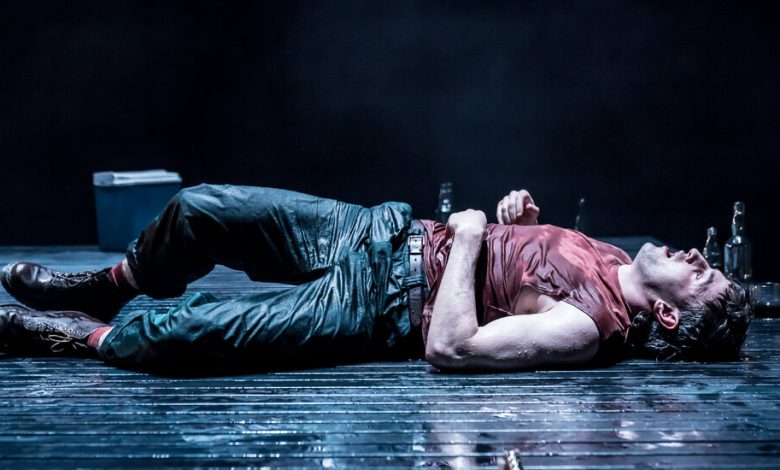Review: Paul Mescal Electrifies in a Revelatory ‘Streetcar’

Paul Mescal’s fast-ascending screen career has taken a detour to the London stage, where he is playing Stanley Kowalski in “A Streetcar Named Desire.” This deeply empathic version of Tennessee Williams’s defining 1947 play is scheduled for a limited run at North London’s Almeida Theater through Feb. 4.
That leaves audiences limited time to discover the sizable stage chops of Mescal, the heartthrob Irish actor who came to TV attention on Hulu’s “Normal People” in 2020 and has recently generated award-season buzz for the movie “Aftersun.” Barely a week has passed of late without his being mentioned for one or another major forthcoming film.
The electricity he generates onscreen is fully evident in this latest “Streetcar” — a play frequently revived in London but rarely with the clarity and power brought to it here by Rebecca Frecknall, an associate director at the Almeida who won an Olivier Award last spring for an ongoing revival of the musical “Cabaret.”
Mescal brings both swagger and sensitivity to the role, in the process stepping out of the long shadow cast over this part by its stage and screen originator, Marlon Brando. But he also exists amid a gifted company who lay bare the numerous contradictions of an infinitely rich play. Not intended as a mere star vehicle for its increasingly high-profile male lead, the visually stripped-back production is emotionally revelatory, too: Frecknall’s forensic skills allow us to look afresh at a motley gathering of people, Patsy Ferran’s tremulous Blanche DuBois chief among them, who seek understanding and compassion but just as frequently come to grief.
Stanley, of course, must fight his corner once he and his newly pregnant wife Stella (Anjana Vasan, outstanding) find their cramped New Orleans quarters taken over by Stella’s older sister, Blanche. Having lost the family ancestral home in Mississippi, Blanche shows up in Louisiana “hot, tired, and dirty” and on the run from a shaming and shameful past that she will clearly never escape.
Purists may balk at Madeleine Girling’s raised platform set, which lacks the scenic divisions of the Kowalski household that the play repeatedly refers to. The impression instead is of an open, porous space where the actors not appearing at that particular moment often sit to one side, primed for action or for gladiatorial combat, even — something Mescal will soon be exploring onscreen.
Visible well above the stage is a drummer, Tom Penn, who keeps ominous pulse with the roiling emotions of the play, as if to amplify yet further the damaged psyches on view. The rape scene ends with Blanche appearing abject in a pool of rain, as if the episode could somehow be washed away.
The text’s paper lantern of legend is onstage, covering the naked light bulb that Blanche finds abhorrent. But the characters defy expectation, both in costume and physical type: Stella appears in various sweaters, incongruous with talk of the sweltering summer heat, while Ferran’s Blanche — dark-haired, large-eyed — is at some remove from the ethereal blondness often associated with this role. Nor does she make her entrance in the character’s signature white suit specified in the text.
The result is a production, performed in the round, that adheres not so much to the letter of the play as to its bruised and bruising spirit. Much the same was true of Frecknall’s acclaimed 2018 revival for the Almeida, also starring Ferran, of Williams’s lesser-known “Summer and Smoke.” Frecknall takes her cue from the wounding lyricism of Williams’s writing, not his (copious) stage directions, though the inclusion of some slow-motion toward the end feels like a directorial intervention too far.
I’ve rarely seen, for instance, the anger that coexists with Blanche’s fragility conveyed as clearly as it is here. She may speak in grandiose terms of her briefly beloved Mitch (an exceptionally touching Dwane Walcott) as her Rosenkavalier, but this Blanche, for all her delusions, seems to understand all too well the rum hand life has dealt her. (On that topic, the card game that ends the play has been cut.)
Brought into the production late on when its original lead, Lydia Wilson, dropped out because of injury, the prismatic Ferran communicates the flighty neurotic in Blanche alongside someone nervy enough to tackle Stanley on his home turf.
“I’ve got to keep hold of myself,” she says near the start, her equilibrium no less fragile than that of the brutish man-child Stanley, who cries like a baby for Stella well before his wife gives birth to their own. The bedroom is Blanche and Stanley’s battlefield, and both actors communicate the primal impulses that draw them together in a permanently disruptive date with destiny.
Mescal, it seems, has his own dates pending with Hollywood, which may make such stage ventures harder for him to come by in the years ahead. (I smiled when Stanley dismisses Blanche’s “Hollywood glamour stuff,” something that the actor playing him surely knows about firsthand.)
Whatever this fine actor’s future holds, his present is allied to an electrifying ensemble production of “Streetcar” that, by rights, won’t have its final stop here.
A Streetcar Named Desire
Through Feb. 4 at the Almeida Theater in London; almeida.co.uk.
